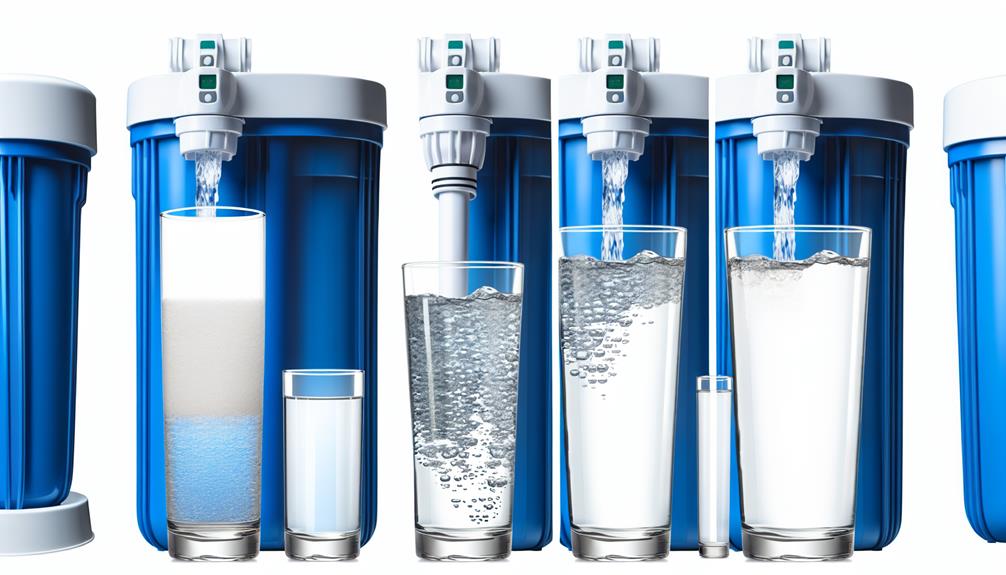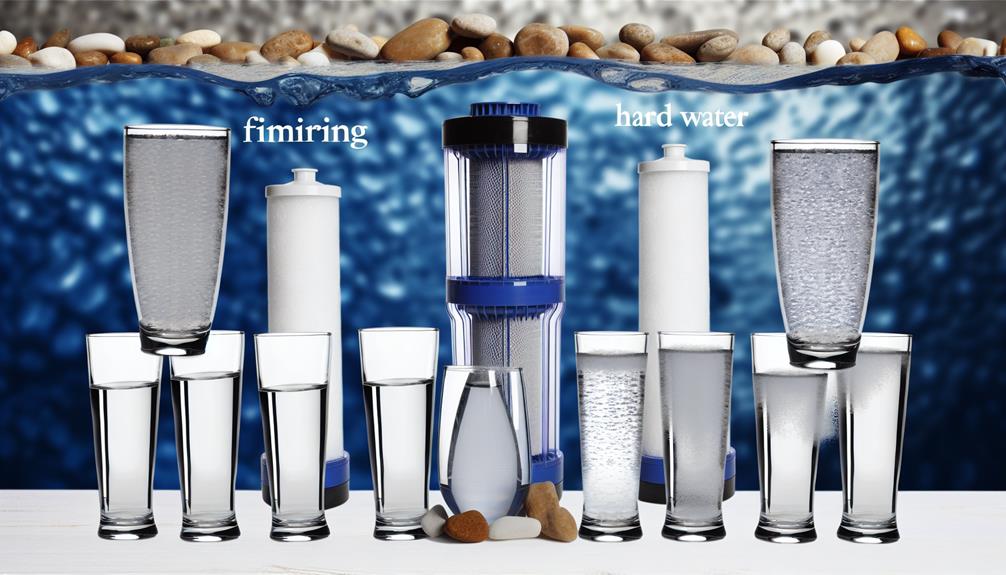As you navigate the murky waters of hard water in your home, it's crucial to find the beacon of a reliable filtration system to guide you to a solution.
You're well aware of the telltale signs: that stubborn scale build-up on your faucets, the lackluster performance of soaps and detergents, and maybe you've even felt the abrasive touch of water on your skin.
It's time to arm yourself with knowledge about the top water filters specifically designed to tackle these hard water issues.
From salt-based softeners that could transform the mineral composition of your water to innovative salt-free conditioners that prevent scale without adding sodium, each option carries its own set of pros and cons.
We'll also touch on the high-tech solutions like magnetic and electronic descalers, and consider whether reverse osmosis systems might be the heavy artillery you need in this battle against mineral invaders.
Stick around to find out which filtration system might just become the cornerstone of your home's water quality strategy.
Understanding Hard Water Challenges
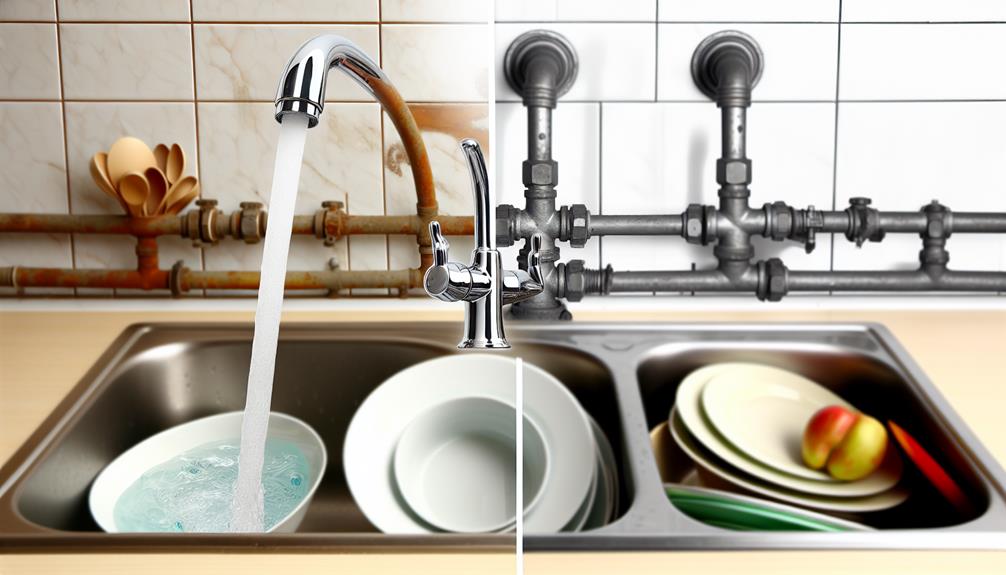
While many homeowners may not realize it, hard water can present a myriad of challenges that affect both household appliances and personal well-being. Hard water is characterized by a high concentration of minerals, primarily calcium and magnesium, which leads to mineral buildup and plumbing corrosion over time. As you assess the water quality in your home, it's crucial to understand the technical implications of these challenges.
Mineral buildup, often manifesting as limescale, can significantly reduce the efficiency of water heaters, dishwashers, and washing machines. This accumulation not only demands more energy to heat water but also diminishes appliance lifespan. You'll notice that detergents and soaps don't lather as effectively in hard water, which can impact both cleaning processes and skin health.
Plumbing corrosion, a less visible but equally critical issue, stems from the continuous flow of hard water through pipes. The minerals can react with pipe materials, causing corrosion that may lead to leaks, restricted water flow, or even complete pipe failure. Analyzing the water quality and installing appropriate filtration systems become imperative to mitigate these risks.
Informed action against hard water can protect your investments and health, making the consideration of a water filter system not just a luxury, but a necessity.
Salt-Based Softener Systems
To combat hard water problems effectively, homeowners often turn to salt-based softener systems, which replace troublesome minerals with sodium ions through a process known as ion exchange. These systems contain resin beads that attract and retain the calcium and magnesium ions responsible for water hardness. As hard water passes through the resin tank, an exchange takes place where the sodium ions are released in place of the calcium and magnesium ions, rendering the water soft.
However, the capacity of these resin beads to facilitate ion exchange isn't infinite. Over time, the beads become saturated with hardness minerals and must undergo a phase called resin regeneration. During this phase, a high concentration of salt solution flushes through the resin tank, effectively displacing the accumulated minerals and replenishing the resin with sodium ions. This regeneration cycle is crucial to maintain the system's efficiency and longevity.
You'll need to monitor the salt levels and ensure the system's settings are optimized for your specific water hardness level. Keep in mind, while salt-based softeners are highly effective, they do increase the sodium content in the water, which mightn't be suitable for individuals on a low-sodium diet. Therefore, it's essential to weigh the benefits against potential dietary concerns before installation.
Salt-Free Conditioner Options
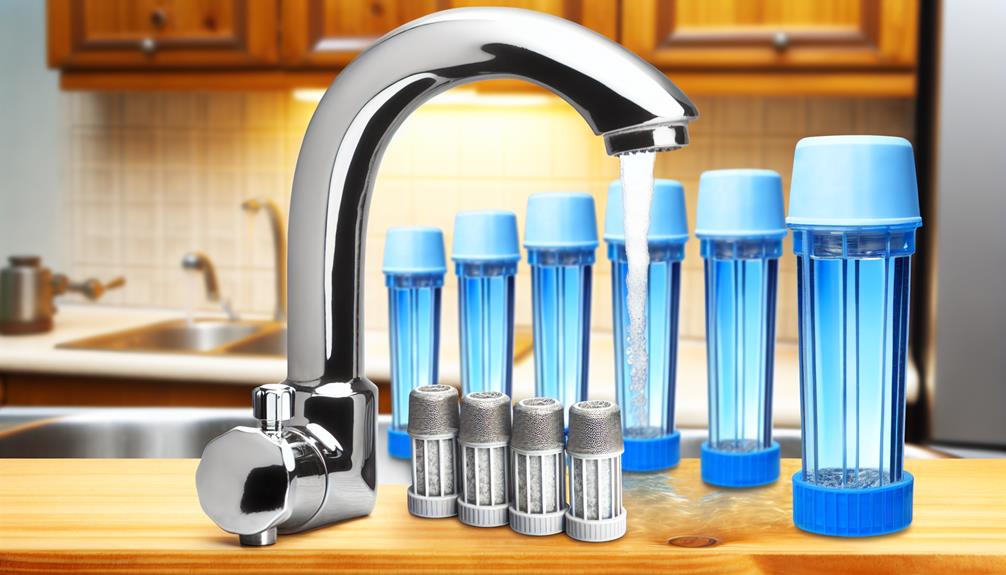
If you're concerned about the increased sodium levels from salt-based softeners, salt-free conditioner options provide an alternative solution for addressing hard water issues without adding sodium to your water supply. Unlike traditional softeners, these systems focus on scale prevention rather than outright removal of minerals.
Here's why you might consider a salt-free conditioner:
- Scale Prevention:
- Salt-free systems use template-assisted crystallization (TAC) or other technologies to alter the structure of minerals such as calcium and magnesium.
- This transformation prevents minerals from bonding and creating scale buildup in your pipes and appliances.
- Maintenance Ease:
- These units don't require regular salt replenishment, which cuts down on ongoing maintenance tasks and costs.
- You'll avoid the hassle of monitoring salt levels and the need for backwashing, which is common in salt-based systems.
Salt-free conditioners are designed for efficiency and effectiveness, reducing scale without the additional sodium content. They represent an environmentally friendly choice that maintains essential minerals in your water while ensuring plumbing and appliances operate smoothly.
As you evaluate your options, consider the technical specifications and performance data to ensure you're selecting a system that aligns with your water quality goals and household needs.
Magnetic and Electronic Descalers
Often overlooked, magnetic and electronic descalers offer a non-chemical method to address hard water challenges by using magnetic fields or electrical waves to alter the properties of scale-forming minerals. These systems are intriguing descaler alternatives to traditional water softening methods, as they don't introduce salts or chemicals into the water. Instead, they aim to change the electromagnetic properties of calcium and magnesium ions, preventing them from crystallizing and clinging to surfaces as scale.
When evaluating magnetic effectiveness, it's crucial to understand the underlying principles. These systems use magnetic fields to disrupt the ionic charges of minerals, theoretically reducing scale formation. Electronic descalers, on the other hand, emit varying electronic waves that can help prevent minerals from sticking to pipes and appliances.
For a clearer comparison, consider the following table illustrating key aspects:
| Feature | Magnetic Descalers | Electronic Descalers |
|---|---|---|
| Method | Magnetic fields | Electrical waves |
| Impact | Alters ionic charge | Prevents mineral adherence |
| Maintenance | Minimal to none | Minimal to none |
Although the scientific community is still debating their overall efficacy, many users report positive results. It's wise to approach these systems with a blend of skepticism and open-mindedness, analyzing empirical evidence and user testimonials to gauge their potential in your specific situation.
Reverse Osmosis Filtration Solutions
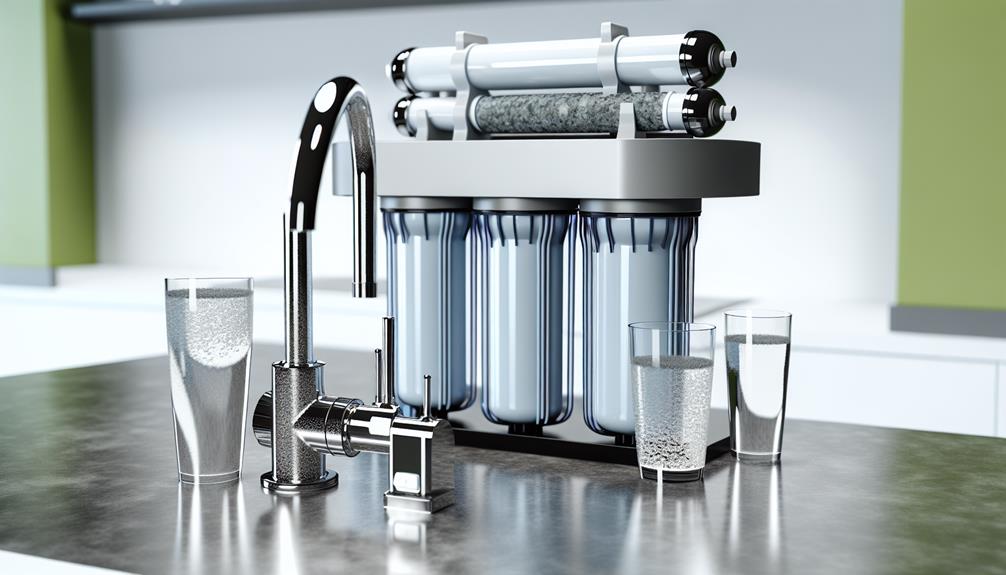
Moving beyond magnetic and electronic descalers, reverse osmosis filtration systems provide a robust solution for mitigating hard water by forcing water through a semi-permeable membrane to remove a vast majority of dissolved minerals and contaminants. This process not only deals with mineral buildup but also enhances the overall filtration efficiency of your water supply.
Key Features of Reverse Osmosis Systems:
- Semi-permeable membrane: Rejects particles down to 0.0001 microns.
- Multiple filtration stages: Often includes pre-filters and post-filters for optimal purification.
Advantages in Tackling Hard Water:
- Reduces scale formation: Minimizes the risk of mineral buildup in pipes and appliances.
- High filtration efficiency: Ensures cleaner, softer water by removing minerals like calcium and magnesium.
You'll find that these systems require periodic maintenance to sustain peak performance, typically involving replacement of the membrane and filters. While the initial investment might be higher compared to other solutions, the long-term benefits include extended appliance lifespan and reduced plumbing repair costs due to lessened mineral buildup.
As you consider a reverse osmosis system, analyze the specific hard water challenges you face. This technical approach to water treatment is highly effective, but it's essential to choose a system that aligns with your water usage patterns and desired maintenance commitment.
Conclusion
You've explored various solutions for hard water—from salt-based softeners to innovative magnetic descalers. Each option offers distinct benefits.
Whether it's the thorough ion exchange process of softeners, the eco-friendly operation of salt-free conditioners, or the purity provided by reverse osmosis systems.
Your choice should align with your specific needs, considering factors like maintenance, efficiency, and long-term costs.
Invest wisely; the right water filtration system will significantly enhance your home's water quality and appliance longevity.
